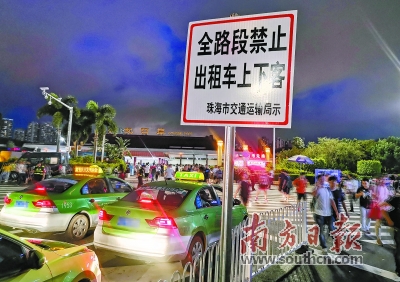
Taxi pick-up and drop-off is prohibited in front of Zhuhai Gongbei Port Plaza.
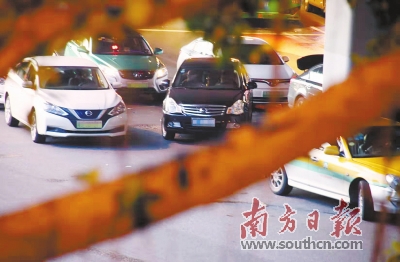
Outside the exit of Guangzhou Railway Station, several cars were parked under the viaduct of Inner Ring Road, suspected to be "black cars" without operating qualifications.
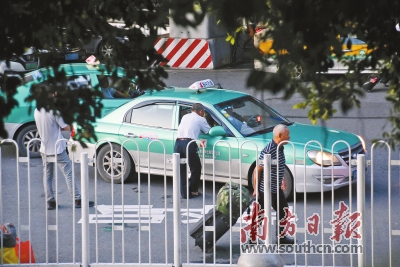
A taxi driver negotiates with passengers near the exit of Guangzhou Railway Station.
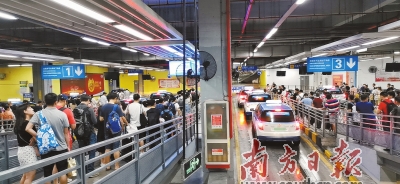
Passengers waiting in line for taxis at Shenzhen North Railway Station.
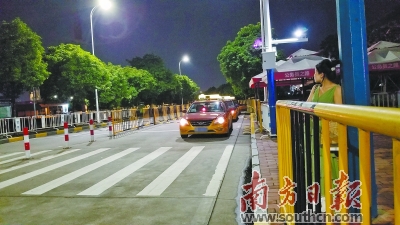
On the evening of the 1st, taxis waited for passengers in the waiting area of Zhongshan Station on the urban rail.
Editor’s note: Since June this year, our province has launched a civilized service improvement action for the taxi industry in the Pearl River Delta region to further standardize business behavior, improve service quality, establish a civilized image, and promote the construction of a humanistic bay area that is livable, suitable for industry and suitable for tourism. To celebrate the 70th anniversary of the founding of New China, create a good social atmosphere. All localities and departments have attached great importance to it, acted quickly, and done a lot of work and achieved initial results. This action will be promoted across the province by the end of this year.
According to the requirements of the provincial party committee, the progress of the current actions in various places is still far from the goal. In order to find out the real situation, on September 1-2, Nanfang Daily dispatched a number of undercover inspection teams to directly attack the chaos of taxi services in key public places in nine cities in the Pearl River Delta, hoping to attract further attention from relevant departments, increase efforts to rectify, and effectively promote the problem.
Why don’t you hit the meter?
Not playing the watch seems to be an unspoken rule
The driver said he could earn twice as much
At around 19:30 on September 2, the reporter arrived at the Foshan bus station and saw seven cars cluttered at the passenger exit. Five of them had obvious taxi signs, and the other two were ordinary cars without signs. Drivers gathered together and waited for passengers to leave the station.
The reporter stepped forward, and before he could speak, a driver asked enthusiastically.
"Where to?"
"It’s quite close, Lingnan Tiandi."
"30 yuan."
"Don’t you play the meter?"
"No watches, no one here watches."
While the reporter was talking to the driver, several drivers next to him immediately surrounded. Seeing the reporter say that 30 yuan is too expensive, a middle-aged man shouted loudly: "20 yuan, it only earns you 10 yuan more than playing a watch." The reporter accepted.
The middle-aged man told reporters that it is an unspoken rule for taxis at the entrance of Foshan bus station not to use a meter. "I tell you that 30 yuan is cheap, sometimes 50 yuan, 60 yuan." After about 10 minutes of driving, although the middle-aged man chatted with the reporter, he seemed very vigilant, staring at the reporter’s mobile phone from time to time.
At about 9 o’clock on the 2nd, the reporter arrived at Jiangmen City Bus Terminal. Five taxis were parked in the taxi pick-up and drop-off area. When the reporter approached, several taxi drivers gathered around and asked about the destination. "If you don’t use the meter, go to Wanda Business District, 30 yuan," said one of the drivers. The reporter’s mobile phone navigation found that the distance was only 3.6 kilometers, and the driver’s price was twice as high as the price of the meter. At this bus station, not using the meter seems to be an unspoken rule. Taxi driver Master Li said: "Who will give you a meter? We have been waiting here for an hour or two."
On the morning of the 2nd, the reporter arrived at the Zhaoqing Yueyun Bus Terminal. There were five or six taxis parked in the passenger area of the station’s taxis. The drivers got out of the car and gathered on the roadside to pick up customers. "Master, do you want to go to Zhaoqing Railway Station?" Because the destination is close, the reporter opened his mouth, and the otherwise enthusiastic taxi driver’s attitude was much colder. "No meter, 40 yuan," one of the drivers said. Others said the journey was too short to take orders.
After the reporter insisted that "the price must be measured by the meter", a driver finally agreed and let the reporter get on the bus. He revealed the "inside story": "It is only about 7 kilometers to Zhaoqing Railway Station, and the price of the meter is less than 20 yuan. You can earn twice as much without the meter. I see that it is not easy for you to carry large bags and small bags, so I started your business."
Why is it rejected?
5 rejections in 20 minutes
Electric cars need to be charged for a reason
On the morning of September 2, the reporter took a taxi from a certain place in Bao’an District, Shenzhen to Nanshan Science and Technology Park. The road conditions were relatively congested, and the 15km journey took about 1 hour. When approaching the destination, due to the large number of cars on the road, the driver asked the reporter to get off at a red light. For safety reasons, the reporter asked the driver to drive through the traffic light and then pull over. When printing the invoice, the driver complained: "It’s really unlucky to receive a ticket like yours to come to the high-tech park."
Since all taxis in Shenzhen have been fully electric, "charging" has become the reason for taxis to refuse to load. The reporter has encountered taxi refusal on the grounds of "charging" many times in Houhai and Science and Technology Park areas in Shenzhen.
On the afternoon of the 2nd, the reporter took a taxi from a certain place in Nanshan District, Shenzhen to Longgang District. The taxi driver introduced that the shift and charging usually start at 3 pm, and the charging time is about 1 hour. Around 5 pm, many areas may experience "taxi difficulties" caused by shift and charging.
In the first half of this year, two taxi drivers at Shenzhen Airport refused to take passengers to Zhangmutou in Dongguan and Hengqin in Zhuhai. The driver said the battery was insufficient or could not be charged after arriving at the destination. Since February this year, the transportation department has set up multiple signs at the entrance of the Shenzhen airport’s waiting area, requiring taxis to maintain sufficient power when entering the station and not refuse to take passengers on grounds such as insufficient power.
At about 12 o’clock on the 1st, the reporter arrived at the main entrance of Zhongshan City Bus Terminal and planned to take a taxi to Xingzhong Square, which is 3.5 kilometers away. In the car general out-of-app, the reporter did not see a special taxi waiting area. After learning that the reporter’s destination was Xingzhong Square, one taxi driver immediately turned and left, while another taxi driver told the reporter: "It is more convenient to take a taxi across the road!"
Following the driver’s instructions, the reporter went to the opposite side of the road to wait for the bus. After 15 minutes, there was still no taxi. The three taxis passing by either refused to take the bus or did not use the meter. The reporter was rejected by five taxis within 20 minutes of waiting for the bus.
At about 10 o’clock on the 2nd, the reporter was at the gate of Zhongshan Boai Hospital and planned to take a taxi to the Zhongshan City Bus Terminal 6 kilometers away. In the no-parking area in front of the hospital, there are three taxis parked scattered, and a driver quoted the reporter 40 yuan. He said: "This price is the same as the meter fee, you can play it or not." He also said that you can issue an invoice without a meter. The invoice amount is determined by the reporter, and the handling fee can be made up. The reporter opened the online car-hailing software and found that the same distance is expected to cost within 30 yuan.
After the reporter got on the bus, the driver took out a handheld invoice printer, connected it to the taxi’s meter through the data cable, and then issued an invoice according to the amount quoted by the reporter. During the driving process, the driver explained why he did not want to use the meter. He said that he drives a new energy taxi, and the monthly "portion money" is half cheaper than ordinary taxis, but the taxi company takes nearly 10% commission for each order. In order to earn a little more, he did not want to use the meter.
Why do you love to fight?
Station staff help pick up passengers
"Black car" is seriously overloaded
"It only costs 120 yuan to go to Baiyun Airport, and the distance is more than 30 kilometers. This price is not expensive, so can you go?" "Go to Guangzhou South Railway Station? There is still a seat, just get on the bus and leave." The reporter visited some stations and subway entrances in Guangzhou and found that the illegal operation of private cars and cars without operating qualifications is widespread, and some vehicles are seriously overloaded in pursuit of profit, which poses a greater safety hazard.
At 5 o’clock on September 2, at the Guangzhou Railway East out-of-app, the voice of the "black car" driver soliciting passengers was endless. "Are you going to the South Station?" "Have you gone to Baiyun District?" Every time a passenger came out of the exit, the driver stepped forward to greet him warmly.
Although a large number of cruise taxis waited in orderly queues at the scene, this did not seem to affect the source of "black cars". One taxi driver said that in order to attract passengers, "black cars" mostly use low prices and carpooling as a "selling point". "The subway bus has not yet left, and passengers in a hurry choose’black cars’ to carpool in order to save money."
At about 6 o’clock on the 2nd, outside the exit of Guangzhou Railway Station, about one or two hundred meters in front of the special lane for cruising taxis, several cars were parked under the viaduct of Inner Ring Road, suspected to be "black cars" without operating qualifications. Drivers crossed the road and wandered to the entrance and exit of vehicles in the railway station square to pick up passengers. Several drivers also took advantage of the opening of the gate to get in and stayed at the passenger exit to solicit business.
A stopped passenger asked the driver: "What kind of car do you drive?" The driver replied: "I drive’Didi ‘." "Isn’t’Didi’ booked online?" The passenger asked him back, waved his hand, and sped away. Some passengers were just moved by the driver’s words, and when they were still hesitating, the driver immediately dragged the passenger’s suitcase to the car.
"Black cars" are also active in many subway out-of-app in Guangzhou. "Are there any in the direction of University Town and Panyu Nansha?" On the night of the 2nd, there were continuous shouts outside the exit of the subway station, and more than 10 cruise taxis and "black cars" were parked on the roadside, and drivers were competing for passengers.
At around 23:40 that day, the reporter saw at the entrances and exits of Guangzhou Hanxi Chimelong Metro Station on both sides of Hanxi Avenue that there were more than 20 "black cars" and cruising taxis, and the success rate of carpooling was high. One of the "black cars" took four passengers to Qifu New Village in Panyu District in less than 10 minutes.
Some taxi drivers are even seriously overloaded in order to increase their income. In the early morning of the 2nd, more than 10 passengers were squeezed into a black seven-seater van with a Guangdong A brand at Guangzhou East Railway Station, and one of the female passengers was holding a baby. In order to carry more passengers, the driver even prepared plastic stools with the car. It is understood that these passengers are all going to Guangzhou South Railway Station to transfer to the high-speed rail. The carpooling price is 20 yuan per person, which is about 1/4 of the normal taxi price. The income of the illegal operation of the van driver can reach about 200 yuan, far exceeding the legal operation of the vehicle.
On the morning of the 2nd, the reporter arrived at the Dongguan City Bus Terminal. In the taxi waiting area, more than 10 cars were waiting for passengers to leave the station. "Where are you going? Dongcheng, right? It just happened to be a carpool." The station staff was picking up passengers and motioning the taxi driver who was waiting next to them to come over.
The driver greeted the reporter and another passenger into the car. "Why didn’t your car stop with other cars, but on the side road?" Faced with the passenger’s inquiry, the driver said frankly: "For short-distance passengers in the city, other drivers don’t want to pull them, so I’ll pull two people by the way."
When the reporter asked about the fare, the driver said: "The taxis waiting at the station do not use a meter. I will charge you 20 yuan each, and the place you go will cost 23 yuan. It is more cost-effective not to use a meter." After arriving at the destination, he took a 40 yuan invoice to the reporter as a ride certificate.
In Dongguan, passenger stations and town streets are the high incidence of taxi chaos. The reporter checked the relevant complaints on the local website of Dongguan and found that taxis are often not metered in places such as Dongguan Bus Terminal and Humen High-speed Railway Station.
Why is it difficult to take a taxi?
It is difficult to take a taxi at the port of entry and exit
Transportation hubs get together
At about 18:30 on September 1, the reporter arrived at Zhuhai Station on the Guangzhou-Zhuhai Intercity Railway train, and as soon as he left the station, he went straight to the temporary taxi pick-up area. Unexpectedly, the scene in front of the reporter was daunting, and at a glance, the long queue had turned a few corners.
Staff at the scene told reporters that such queues are common, and the same is true at the nearby Gongbei Port pick-up point. "Now there are about one or two hundred people queuing up for taxis, and it is estimated that it will take an hour or two." The staff member said. In desperation, the reporter had to carry his luggage and walk to Qiaoguang Road, 700 meters away, to take the online car-hailing. Due to the serious traffic jam on the Gongbei section, the reporter took the online car-hailing car around 19:30.
The average daily traffic counting at Gongbei Port and Zhuhai Station on the urban rail is hundreds of thousands, and there are only two taxi pick-up points currently available. "Difficulty in taking a taxi" has become a major pain point.
Previously, three taxi pick-up points were set up near Gongbei Port, namely the taxi special area of Gongbei Port Bus Terminal, the temporary taxi pick-up area of Zhuhai Station on the urban rail, and the taxi pick-up point of Qiguan Station. Affected by the transformation of the underground passage, since July 27 this year, the taxi pick-up point of Qiguan Station has been cancelled, leaving only two pick-up points on the ground.
There are many passengers, few cars, and long queues, and many problems have arisen. Some citizens reported that when taking a taxi near the Gongbei Port, they often encounter problems such as taxi drivers not taking short-distance orders, "black car" drivers picking up passengers halfway, and bargaining.
"As soon as I said to go to Qianshan, several taxi drivers were unwilling to go because it was relatively close. When I went to the hotel opposite the port to continue taking a taxi, a silver private car drove over and took the initiative to open the door to signal us to get on the bus." A citizen said that at that time, he carried a large bag and a small bag with two children, so he had no choice but to take the "black car" home.
On the 2nd, when the reporter made an unannounced visit to several transportation hubs in Huizhou City, he saw a large number of "motorcycle" solicitors, and social personnel distributed small advertisements. At about 10 am on the 2nd, many passengers left the bus terminal in Huizhou City. In front of the square, a row of "motorcycle" had already been waiting here, and drivers beckoned to pick up passengers. Since the taxi stop was on the negative first floor, some passengers did not pay attention to the signs and could not find their places. In this area, many social personnel stopped passengers to distribute advertising slips. (Text/Photo: Nanfang Daily Unannounced Visit Team)